 Futurists anticipated a lot of important things. They imagined space before we got there. They saw the environmental disaster of this century from a long way away.
Futurists anticipated a lot of important things. They imagined space before we got there. They saw the environmental disaster of this century from a long way away.
But there are two things they got very, very wrong. Computing and resources.
Look at Star Trek. The communicators and tricorders used in the 1960s version of the show were primitive by early 21st century standards. As one cartoon put it, “all it does is make phone calls?”
I don’t know of a single SciFi author of any renown who saw Moore’s Law coming. Most defined progress through manufacturing automation, which only improves arithmetically. Even those seeing improvements in computing didn’t see how Moore’s Law would take off in every direction computing touched. They didn’t see the iPhone and didn’t see the cloud.
William Gibson came closest. In Neuromancer he imagined something called “cyberspace.” But it was strangely primitive next to the modern Internet. He has since watched throughout his career as history caught up with him. His later novels seemed to take place in the present. His latest, Agency, is alt-history.
As wrong as futurists were on computing, they’re even more wrong on resources. Most writers, like Allen Steele, saw today’s Near Space era as a battle for resources. We would be running out of heavy metals, the thinking went, and ways to generate electricity. We would need to mine the asteroids.
 We don’t need to mine the asteroids. That’s because computing, and the sciences growing out of it, allow for substitution. Worried about what goes into your solar panels? Well, it will soon be perovskite, a rock just as abundant as sand. Windmills don’t have to be giant things that kill birds. You can draw power from the center of an Interstate. We don’t need lithium for all our batteries, either. You can store energy by just pumping water uphill.
We don’t need to mine the asteroids. That’s because computing, and the sciences growing out of it, allow for substitution. Worried about what goes into your solar panels? Well, it will soon be perovskite, a rock just as abundant as sand. Windmills don’t have to be giant things that kill birds. You can draw power from the center of an Interstate. We don’t need lithium for all our batteries, either. You can store energy by just pumping water uphill.
Because futurists have been wrong about so many things, we’re on the verge of another Cold War, this time with China. Neither side can afford it. Most Chinese cities already look like 19th century London. Waterways there are as foul as ours were a century ago. We can’t afford a military build-up either. Not when there are so many environmental investments that we need to make.
The point is that the future can still be won. The dystopian view, fueled by an assumption of scarcity, is the wrong one. As Mark Twain wrote over a century ago, “Dream other dreams, and better.”










